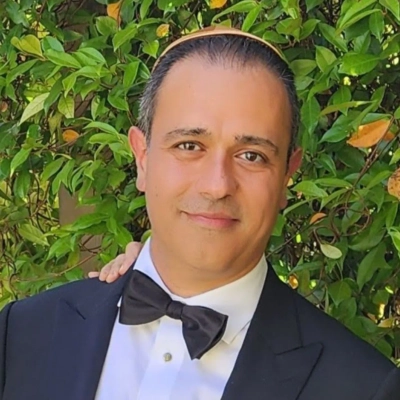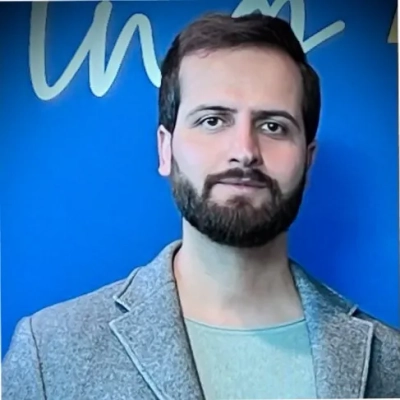17 Ways to Balance Passion with Practical Career Considerations
Finding the sweet spot between what you love and what pays the bills remains one of the toughest challenges professionals face today. This article breaks down 17 practical strategies to help align passion with career stability, backed by insights from experts who have successfully made this balance work. These approaches cover everything from building support systems to scaling at a sustainable pace, offering concrete steps rather than abstract advice.
Embrace Product Management for Educational Impact
Balancing passion with practical career considerations required me to evaluate both long-term goals and immediate opportunities. Early in my career, I was deeply committed to education and supporting students as a writing instructor at UC Berkeley, but I also recognized the potential impact and growth that entrepreneurship could offer. One compromise that enhanced my career satisfaction was taking a product management role at Chegg after selling WriteLab. While it was a shift from teaching and directly shaping student experiences, this position allowed me to work on AI-driven educational tools at scale, gaining experience in product strategy, leadership, and technology development. This compromise expanded my skill set, deepened my understanding of how technology can enhance learning, and ultimately informed my vision for Rephrase Media. By embracing opportunities that aligned with both my interests and practical growth, I was able to pursue my passion for education while building a career with meaningful influence and long-term impact.

Build a Strategic Support System
Balancing passion with practical career considerations has been an ongoing journey for me, particularly when I was building my business. Initially, I tried to handle everything independently, believing that self-reliance would accelerate my progress, but I quickly learned that professional isolation actually hindered my clarity and effectiveness. The compromise that significantly enhanced my career satisfaction was establishing a strategic support system—identifying mentors for insight, peers for accountability, and close friends for emotional grounding. Implementing structured weekly check-ins with this core circle and adopting time blocking techniques allowed me to maintain focus on my passion while addressing practical business needs. What started as a perceived compromise—admitting I couldn't do everything alone—ultimately became the foundation for both greater business success and personal fulfillment in my career.

Create Structure Around Your Passion
For most of my twenties, I treated passion and practicality like opposites—one was for dreamers, the other for adults. It wasn't until I burned out chasing "safe" roles that I realized the real balance comes from building structure around your passion, not instead of it.
My passion was strategy and storytelling—helping people and brands find clarity in complexity. But I also had bills, responsibilities, and a growing sense that idealism alone wouldn't pay rent. So the compromise I made was this: instead of waiting for the perfect role that matched every interest, I built a practical runway that funded my creative freedom. I took consulting work that sharpened my operational and analytical skills—areas that didn't feel romantic but gave me the financial stability and business literacy I now rely on every day.
Ironically, that "compromise" ended up being the multiplier. The structure gave me the freedom to take creative risks without fear. I could say no to misaligned projects, invest in personal growth, and build something that reflected both who I was and what the market needed. Passion without discipline burns out fast; practicality without meaning leaves you empty. The sweet spot is where those two meet—where your craft not only excites you but sustains you.
Looking back, the trade-off wasn't between passion and practicality—it was between fantasy and longevity. Choosing the latter gave my career roots and direction, and that's been far more fulfilling than chasing either extreme.
Accept Discipline to Refine Creative Craft
Finding the right balance between my passion and the necessity of the situation was always a matter of intention. When I was starting, I found that the only emotion that couldn't pay the bills, pragmatism without emotion, was still unfulfilled. Therefore, I combined these effects by selecting work that was demanding my imagination and at the same time fitting the market. Writing was my true vocation, I gradually adapted it to different sectors: advertising, branding, and storytelling, making my passion economically viable. The moment of change was when I accepted discipline: submission dates, client briefs, and analytics didn't restrict my creativity; they made it more precise. The toughest bargain was to give up whole creative freedom in exchange for meaningful guidance. Unexpectedly, that decision increased my pleasure in seeing my words not only motivate but also produce measurable effects. It taught me that satisfaction often lies where your passion intersects with world impact.

Focus on Process Over Subject Matter
Many of us are taught to see this as a zero-sum game: either you chase your passion and risk instability, or you take a stable job and let your dreams wither. This framing forces a false, and often paralyzing, choice. The reality I've seen, both in my own career and in guiding others, is that satisfaction isn't found at either extreme. It lives in the thoughtful integration of the two, but not in the way most people expect. It's less about finding a perfect 50/50 split and more about redefining what "passion" and "practicality" actually mean to you on a daily basis.
The most valuable compromise I ever made was to let go of the *subject* of my work as the primary source of passion. Early on, I was convinced I had to work in a specific "creative" field to be happy. The compromise was realizing that my actual passion wasn't for a particular industry, but for a particular *process*: solving complex, messy problems and helping a small team find clarity. I found I could do that in a less glamorous B2B software company just as easily, if not more so, than at a flashy consumer brand. This shifted my focus from finding the "right" industry to finding the right kind of challenge, the right team dynamics, and the right level of autonomy.
I once worked with a talented writer who dreamed of being a novelist but was burning out trying to make a living from freelance articles while writing his book at night. The practical compromise he made was taking a full-time job as a technical writer for a complex engineering firm. It sounded like the death of a dream, but the opposite happened. The stable hours and benefits removed his financial anxiety, freeing up his mental energy for creative work. More surprisingly, he found deep satisfaction in the craft of making difficult concepts simple and clear. The job didn't diminish his passion; it funded it, protected it, and unexpectedly, even nourished a different part of his love for language. It taught him that a "practical" job doesn't have to be a waiting room for your real life; it can be the foundation that makes it possible.
Shift From Doing to Teaching Others
Early in my career, I was set on doing hands-on fieldwork full-time because that's what I loved most—solving problems directly for customers. But as the business grew, I had to step back from daily service calls and focus more on leadership, training, and strategy. At first, it felt like giving up the part of the job that made me happiest.
The surprise was how much satisfaction came from helping others get great at the work I used to do myself. Seeing technicians succeed using methods I'd helped develop turned out to be even more rewarding than doing every job personally. The compromise—shifting from doing to teaching—ended up expanding my impact and keeping my passion alive in a new way.

Release the Need for Immediate Success
In the beginning, I tried to keep my passions separate from what I did to earn a living, and that approach quickly wore me down. Eventually, I learned that true balance isn't about choosing between what you love and what's practical. It's about weaving them together. I grounded myself in a reliable career while letting a sense of purpose quietly shape the direction of my spiritual work. The turning point came when I stopped rushing the process. Releasing the need for success to fit a certain image allowed my path as a hypnotist and spiritual coach to take form in its own time.

Scale Slower for Full Practice Control
Choosing direct primary care was that balance for me. I wanted time with patients, not a checklist driven by insurance codes, but I also needed financial stability. The compromise was scaling slower. I started small—limited panel, modest space, minimal overhead. It meant longer hours in the beginning and less income than a traditional clinic, but it gave me full control over how I practiced. That slower growth ended up being the win. It forced me to build sustainable systems and stronger relationships with patients. Over time, that trust turned into steady membership growth and word-of-mouth referrals. The trade-off between speed and freedom looked like a setback early on, but it became the reason I still love the work. It's proof that sometimes the best compromise is patience.

Cap Growth to Maintain Quality Standards
I balanced the pursuit of my passion for hands-on, quality construction with the practical career consideration of running a profitable business by making quality craftsmanship the foundation of my entire business model, rather than just a personal goal.
The approach is simple: My passion is building things that last. I could have chased high-volume, cheap contracts for quick cash, but that compromises the quality I care about. Instead, I made the conscious decision to only pursue premium, complex, custom roofing projects. This drastically reduced the number of jobs we took on, but it increased the complexity, the challenge, and the profit margin on every job we completed.
The compromise that actually enhanced my career satisfaction was giving up the idea of rapid, exponential growth. I deliberately capped the size of my crew and the number of simultaneous projects. This felt like a compromise on market share, but it guaranteed I had the time to personally oversee the most critical phases of every job, ensuring the workmanship met my own uncompromising standards.
My advice to other business owners is to stop viewing your passion as separate from your business plan. The best way to achieve balance is to find the point where your personal passion (for quality, design, or service) is the very thing that justifies your premium price and differentiates your brand. Invest in protecting that core passion, because that commitment to excellence is what makes the demanding work truly satisfying.
Apply Theory Through Practical Analytics Work
I used to think that to be engaged in my field of interest, which is economic research, I needed to remain in academia where intellectual rigor would be most akin indeed. The tradeoff was met as I took up a job in applied analytics with a private company which appeared contradictory to such endeavor. With time, the application of theory into practical models, at least in the sense of data determining the outcomes of investment or policy, would be more satisfying than anything ever achieved by academic publication. The practical setting was a test of pressure in ideas, and punished abstractness and promoted clarity.
The change did not soften the passion; it only made it sharper. The limitation of quantifiable outcomes contributed to the superior questions and more rigorous thinking. I found out that fulfillment is not connected with setting, but with the fact whether the work constantly polishes your curiosity and influence. The concession that appears to be a compromise sometimes transforms into the condition that keeps the meaning and the momentum going.

Trade Speed for Lasting Change
I learned to trade speed for staying power. When I joined Sunny Glen, I was chasing passion hard—ready to change lives overnight. The practical side hit quick: budgets, burnout, and bureaucracy. So I made a deal with myself to move slower but stay steady. That shift kept the mission alive without draining me. The compromise wasn't about giving up passion, it was about pacing it. Taking time to build systems, mentor others, and measure real impact made the work more meaningful. The thrill of the quick win faded, but the satisfaction of lasting change hit deeper. Passion's not the fire—it's the fuel. You just have to burn it right.

Transform Individual Care Into Scalable Compassion
The balance came from reframing passion as purpose within structure. I wanted to stay close to patient care while pursuing a leadership path, so I transitioned into healthcare operations rather than leaving the clinical setting entirely. The compromise meant trading hands-on interaction for system-level impact, where process improvements could influence thousands of patient experiences instead of a few per day. What seemed like a step away from passion actually deepened it—transforming individual care into scalable compassion. The experience proved that fulfillment isn't lost in compromise when the core motivation remains aligned with meaningful outcomes.

Adopt Bi-Vocational Ministry for Grounded Connection
At the beginning of my ministry career, I had to deal with the conflict between working in the church as a full-time pastor and being economically stable in order to support my family. The idea of bi-vocational work appeared to be a trade off initially- a divided attention between calling and career. Over time, it became a gift. The experience of working outside the church led me to encounter the day-to-day challenges that many church members go through and this has made me base my sermons and advice on the experience that I have had. It also enhanced my knowledge on stewardship where I learned that faithfulness is possible in a professional structure. That practicality and passion came to the rescue to give some reality to ministry. It helped me to remember that vocation is determined not by time one spends behind the church walls but by the consistency of the purpose taken anywhere. The tradeoff previously seen as restrictive became the medium between ministry and life, which was added to it.

Prioritize Strategic Oversight Over Hands-On Mechanics
Balancing passion with practical career considerations requires an understanding that sustainability is the ultimate form of passion fulfillment. You cannot pursue a passion that fails to pay the bills. For me, the passion lies in solving complex logistical and operational puzzles within high-stakes environments.
My biggest compromise that actually enhanced my career satisfaction was limiting the scope of my direct, hands-on mechanical work to prioritize strategic oversight. Early on, I wanted to be in the shop, troubleshooting every diesel engine personally. The practical reality was that Autostar Heavy Duty needed someone focused on scaling the entire quality and supply system for heavy duty trucks.
As Operations Director, the compromise meant stepping away from the wrench but gaining the ability to ensure that thousands of OEM Cummins parts were sourced, certified, and delivered flawlessly. I traded one-on-one mechanical problem-solving for systemic problem-solving. This decision was pivotal because it allowed me to apply my expertise to designing the Brand new Cummins turbos with expert fitment support program and the logistics chain From Texas to Local, magnifying my impact.
As Marketing Director, this strategic shift provided the core narrative for our brand: we are experts who understand the granular details, but we are positioned to provide scalable, guaranteed solutions. This compromise didn't diminish my passion for mechanical integrity; it formalized it into a powerful, profitable business model that allows me to lead a team of Texas heavy duty specialists in a strategic capacity. I traded tactical satisfaction for strategic fulfillment.

Take Smaller Projects for Sustainable Cash
When I started SourcingXpro, I was driven by excitement for building bridges between global buyers and Shenzhen factories. But passion doesn't always pay the bills early on. So, I made a deal with myself—half the time chasing big ideas, half focused on systems that actually made money. One compromise was taking smaller sourcing projects with a 1,000 USD MOQ just to keep cash flowing while developing our 5% commission model. Funny enough, that "practical" move opened doors to hundreds of long-term clients later. It taught me passion isn't about avoiding trade-offs—it's about choosing the ones that keep your dream sustainable.

Choose the Harder Path for Broader Horizon
For me, passion and practicality were never two separate paths — they had to be the same one. I've always been fascinated by medicine, health, and how they intersect with technology and finance. Early on, I actually considered going into computing. I loved programming and the logic behind how systems work. But I realized that through medicine, I could still engage deeply with technology — from imaging systems to advanced materials — while also making a tangible impact on people's lives.
I knew medicine would be the harder road. The training is long, the hours are relentless, and the stakes are high. But I've always believed that if you choose the harder path — the one that stretches you — you end up finding more meaning in it. That's what led me to interventional radiology, where I work with cutting-edge devices, med-tech, and materials like nitinol, and where innovation never stops. In the future, it may even include graphene — a field I'm already exploring through my other ventures.
That doesn't mean every part of my work is thrilling. There are administrative or procedural tasks that aren't exciting, but I try to approach them as if I love them, because they enable the work I truly care about. Passion, to me, isn't about constant excitement — it's about sustained purpose.
A mentor once told me, "Do the hardest thing." He was a neurointerventionalist who wanted to become both a pilot and a doctor. His mother told him, "If you become a doctor, you can still fly. But if you become a pilot, you can't practice medicine." He chose the harder path — and ended up doing both.
That story stuck with me. It taught me that sometimes the path that feels more demanding isn't a compromise — it's the combination that leads to fulfillment. The harder choice often carries the broader horizon.
—Pouyan Golshani, MD | Interventional Radiologist & Founder, GigHz and Guide.MD | https://gighz.com

Master Your Current Skills First
As a young professional, I read a book that reset my thinking and enabled me to balance this dilemma - "So Good They Can't Ignore You" by Cal Newport.
The book reminded me that the idea of 'chasing your dream' sounds great in theory, but a hobby is unlikely to turn into a job just like that. He proposes that instead of having a vague (though inspirational-sounding) aim of 'follow your passion', you should aspire to 'be so good at what you love' that they simply can not ignore you.
Yes, we all hear stories about the banker who quit & became a successful photographer or yoga instructor or writer. But the truth is that for each success story, there are hundreds or thousands of failures too.
The idea of pursuing your passion as a career sounds great in theory, but is very rarely practical. In fact it can be dangerous and set you up to constantly be chasing unrealistic expectations, or worse, get stuck in an unnecessary job-hopping spiral.
With this profound (yet simple) tweak in philosophy I stopped day-dreaming about living off hobbies. I enjoyed my passions for what they are, and I continued with my "day job" because I already had the skills for that and I know they couldn't ignore me.





